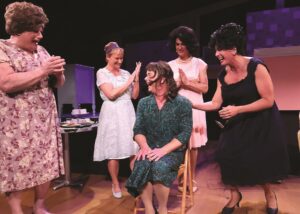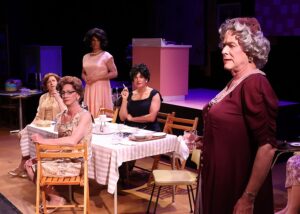When Harvey Fierstein’s Casa Valentina premiered on Broadway in April 2014 — only nine years ago — Obama was president, the Supreme Court decision that made same-sex marriage a Constitutional right would not happen till the following summer, and transgender politics were not yet at the center of American debate.
Fierstein had been inspired to write the play by Casa Susanna, a book that featured found photographs of cross-dressing men at a private oasis in the Catskills mountains an hour northwest of New York City. From the mid-1950s to the early ’60s, this bungalow compound was known as Chevalier d’Eon, named after an 18th-century cross-dresser and spy. It was run by a cross-dressing man named Tito Valenti and his wife, Marie, who owned a wig store in nearby Jewett, N.Y. In women’s clothes, Tito was Susanna; in later years, she would identify as a trans woman and rename her ramshackle outpost Casa Susanna.

At the time, the Catskills was known as the “Borscht Belt” because of the resorts there that catered to Jewish vacationers — including my family, who frequently took weekends at Grossinger’s in the 1960s. Most non-Jews are familiar with the area from the movie Dirty Dancing. But I think it’s fair to say that only those who frequented Chevalier d’Eon and locals in Jewett knew that this particular place existed at all.
Fierstein first made a name for himself with his Tony Award-winning play Torch Song Trilogy, which opened on Broadway in 1982 starring himself as Arnold Beckoff, a drag queen with a domineering mother, bisexual boyfriend, and gay teenage foster child. It was both funny and deeply moving, and Fierstein’s gravelly voice and openly gay identity became iconic.
In the years that followed, he wrote the books for Broadway musicals (La Cage aux Folles, Legs Diamond, A Catered Affair, Newsies, and Kinky Boots) and acted on Broadway (as Edna Turnblad in Hairspray and Tevye in Fiddler on the Roof) as well as in movies and on TV. But he didn’t have another play on Broadway until Casa Valentina, which, despite decent reviews and four Tony nominations, closed in June 2014 after 79 performances.
This is a shame, because it’s a bold, thoughtful, entertaining, well-written, and powerful play, one that’s ahead of its time in its look back into the queer past. Luckily, it caught the attention of Provincetown Theater Artistic Director David Drake, who has brought it here at a moment when transgender rights are under relentless and brutal right-wing attack.
It’s an ideal moment to transport oneself to 1962, when cross-dressing and homosexuality were crimes. Those who were caught were branded as mentally ill, and many died by suicide. In most places, it was nearly impossible to live a “normal” life and be open about either.
With that in mind, we enter the world of Casa Valentina as Jonathan (Dustin Ross), a neophyte, meets Rita (Laura Scribner) — who runs the compound with her husband, George/Valentina — and Bessie (Ken Lockwood), a guest who has arrived early.

In this Catskills haven, the cross-dressing men define themselves as dual personalities, male and female, depending on what they’re wearing. They use the now outdated term “transvestites” to refer to themselves and consider themselves to be exclusively heterosexual — most are married to women.
We also meet George (Scott Cunningham) before he transitions to Valentina. He has been dealing with the local post office, which has been investigating gay erotica addressed to the Chevalier d’Eon. He’s also stressed because he’s broke. One expected guest, Isadore/Charlotte (William Mullin), has a plan to turn the place into a national nonprofit organization and thus legitimize it — with the proviso that homosexuals would be forbidden. George/Valentina is hoping the plan will be approved by his guests, and that it will bring wider interest — and funds — to his Catskills retreat.
But the plan has yet to be revealed — and when it is, it sparks a tumultuous reaction. As the weekend of partying begins, we see Jonathan, trembling in anticipation, put on women’s clothes and become Miranda; we see George, with a drink and a sigh, put on makeup and become Valentina; and we see the transparent joy of the group — including young Gloria (Thom Markee), jaded Amy (John Dennis Anderson), and feisty old Terry (Paul E. Halley) — socializing as women, joking and telling stories, and we’re offered a vivid sense of why their secret identity is so essential to who they are.
Ellen Rousseau’s stunning multilevel set, spanning the full length of the theater, brings the many rooms of the compound together while also expressing the compartmentalization of the cross-dressers’ lives. Drake directs his ensemble of mostly local talent with remarkable precision and depth: each character is an engaging and unique individual, and they act together like musicians in an orchestra. It’s virtually impossible to single anyone out, but the two cisgender women in the cast — Scribner as George’s wife, Rita, and Anne Stott as The Judge/Amy’s daughter — are heart-wrenching. Rita is arguably the central character of the play, and Scribner capably lives up to the challenge.
The play’s core crisis has to do with the curse of demonization and secrecy and the way minorities are pitted against each other by authorities — in this case, cross-dressers against gay men. The conflict is presented in a purely organic way: the play is not didactic, though some critics accused it of this in 2014. Markee’s Gloria makes an argument for tolerance that is timeless, encapsulating the author’s point of view.
But Casa Valentina goes beyond that, planting the seeds for the more sophisticated transgender identity politics of today. Fierstein does this by examining the regressive ideas of the past and coming up with a grand, old-fashioned play (two acts and an intermission; 2 hours and 10 minutes) with a twist on Eugene O’Neill’s usual theme: it’s not that we all need illusions in order to survive this world, but that the illusions of gender we create for ourselves may be the cultural constructs we need to live by. They are, in fact, our personal truths.
Petticoat Junction
The event: Casa Valentina, a play by Harvey Fierstein
The time: Thursday through Saturday at 7 p.m.; Sunday at 2 p.m.; through May 28
The place: Provincetown Theater, 238 Bradford St.
The cost: $50; see provincetowntheater.org for information



